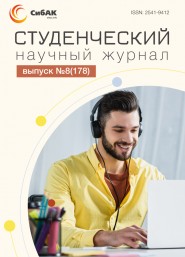Статья опубликована в рамках: Научного журнала «Студенческий» № 8(178)
Рубрика журнала: Педагогика
Скачать книгу(-и): скачать журнал часть 1, скачать журнал часть 2, скачать журнал часть 3, скачать журнал часть 4
TEACHER OF INCLUSIVE EDUCATION
ABSTRACT
Inclusive education is one of the components of multicultural education. This is a relatively new field of pedagogical knowledge, which attracts the attention of not only specialists, but also the general public. The development of this direction of modern pedagogical science and educational practice is due to the very essence of the processes of democratization and humanization of social life, the desire to create a society in which respect for the individual is cultivated, the dignity and rights of each person are protected.
Inclusive education is the process of development of general education, which implies accessibility of education for any child, which provides access to education for children with special needs.
Keywords: teacher, inclusive education, pedagogy.
Who is an inclusive education teacher? The teacher should know well and represent the activities of the students whose development process he directs. Thus, the teaching profession requires double training – human and special. Inclusive education is part of the practice of modern schools, it poses many complex issues and new challenges.
A teacher preparing to work with children with disabilities should adopt the following system of professional and value orientation: recognition of the value of a person's personality regardless of the severity of his violation; understanding of the creative essence of pedagogical activity with children with disabilities, requiring large spiritual and energy costs, etc. An important component of the professional and personal readiness of a teacher working with people with disabilities, in my opinion, is the willingness to provide first aid.
In the educational process, the teacher must master the forms and methods of teaching that go beyond the lesson. Use special approaches to learning in order to include all students in the educational process: with special educational needs; gifted students; students for whom Russian is not their native language; students with disabilities.
In connection with the spread of the ideology of the Federal State Educational Standard, which welcomes the change of the traditional role of the teacher as a "lesson teacher" due to the expansion of the role repertoire, the terms denoting new professional positions - "facilitator", "moderator", "metor" - have entered the everyday life of Russian pedagogy.
In Russian pedagogy, facilitation is understood as a phenomenon of interpersonal communication that enhances the productivity of teaching or educating subjects of the educational process due to their special communication style and the personality of the teacher. Attributes of the concept of "facilitation" are such qualities as truth and openness, acceptance and trust, empathic understanding, congruent self-expression in communication, i.e. self-identity. This interpretation focuses on psychological qualities, the development of which is not amenable to algorithmization.
For a teacher of additional education, knowledge of facilitation technology will help to effectively organize joint activities with children and parents, because from the point of view of the process approach, facilitation is a group structure management that helps the group effectively achieve a common goal, minimizing interpersonal problems that people face when working together.
Pedagogical tasks of achieving metasubject results - the development of students' design skills, communication skills, teamwork skills - are also solved by such an up-to-date technology as moderation. Moderation as an activity appeared in the Vatican, and in the 60-70s of the XX century. in Germany, it was developed as a technology for regulating interactive communication and was initially used in the media to conduct discussion columns.
The role of moderator also fundamentally changes the position of the teacher - from "superstructure from above" to managing the situation "from the inside", when group work becomes structured and purposeful. The goal of the teacher-moderator is to organize group work in a cooperative mode while respecting the equality of its participants. The similarity with the role of the facilitator lies in the teacher's rejection of authoritarian control, value judgments and direct influence on the result, and the difference from facilitation is manifested in a more impartial position and a shift of attention from the result to the process. For a teacher in the role of moderator, it is important not so much to stimulate the participants of the discussion to make an effective decision, as to regulate information flows and emotional background during group work, therefore, the neutral position of the teacher is specially pronounced in advance for all participants in the process.
Thus, the professional and personal readiness of a teacher to work with children with disabilities presupposes the formation of a whole complex of qualities that are based on personal resources.
Good teachers are not born - they become. Of course, it is impossible to make everyone brilliant teachers, but it is absolutely possible to teach teachers to be effective and do their job well.
References:
- Алехина С.В. Инклюзивное образование в Российской Федерации // Доклад Алехиной С.В., представленный 7.12.2010 года в рамках Международного симпозиума «Инвестиции в образование - вклад в будущее». - С.102
- Горюшина, Е. А., Гусева, Н. А., Румянцева, Н. В. Повышение доступности реализации дополнительных общеобразовательных программ для детей с ограниченными возможностями здоровья [Текст] : метод. рекомендации / Н. В. Румянцева, Е. А. Горюшина, Гусева Н. А. – Ярославль : изд-во ЯГПУ, 2018. - 103 с
- Инклюзивное образование. Выпуск №1 / Фадина А.К., Семаго Н.Я., Алехина С.В. - М.: Центр «Школьная книга», 2010. - С.132
- Сабельникова С.И. Развитие инклюзивного образования. Справочник руководителя образовательного учреждения. - 2009 г. -№1. - С.54.
- Семенова, Л. Э. Психологическое благополучие субъектов инклюзивного образования [Электронный ресурс] : учебно-методическое пособие / Л. Э. Семенова. - Электрон, текстовые данные. - Саратов : Вузовское образование, 2019. - 84 с. - 978-5-4487-0514-4. - Режим доступа: http://www.iprbookshop.ru /84679.html


Оставить комментарий